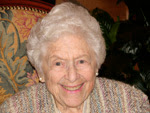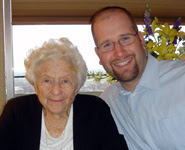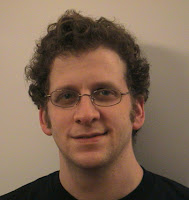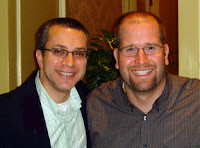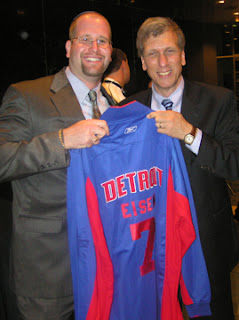Yes, technology is increasingly more important in Judaism. Ten years ago when I wrote my senior thesis in college on “The Globalization of Judaism” focusing on how new technology has affected the global Jewish community, I predicted that in the future congregations would communicate with their membership via e-mail and that Jews would choose their spiritual communities by shopping on the Web.
That time is certainly here. Like many rabbis, I send out a weekly newsletter via e-mail to my membership. With over 400 subscribers to our Constant Contact subscription service, the list is growing and it gives me an opportunity to share my thoughts, words of Torah, and programming updates with our congregants.
 With the launch today of ShulShopper.com by jewschool.com blog creator Daniel “Mobius” Sieradski (in photo), Jews throughout the world will be able to shop for the minyan/shul/community that best fits their needs. I’ve already registered my congregation, Agudas Achim, in the ShulShopper.com database.
With the launch today of ShulShopper.com by jewschool.com blog creator Daniel “Mobius” Sieradski (in photo), Jews throughout the world will be able to shop for the minyan/shul/community that best fits their needs. I’ve already registered my congregation, Agudas Achim, in the ShulShopper.com database.
Sue Fishkoff touched on the many benefits of shuls turning to new technology and communication in her JTA article yesterday. It was nice to read about the usual suspects – my colleague Sharon Brous’s Ikar minyan in LA and the archetypal Kehillat Hadar in NYC co-founded by Elie Kaunfer – but I was especially pleased to see that the Seattle-based Kavana was included even though its founder and my classmate Rachel Nussbaum was not interviewed.
Here are some selections from Sue’s article, the full text of which is available on the JTA website.
New congregations see ‘Net results in communication and cost savings
By Sue Fishkoff
SAN FRANCISCO (JTA) — When Ikar, a 3-year-old congregation in Los Angeles, wants to make an announcement to the 1,500 people on its mailing list, it doesn’t send a letter. It sends an e-mail.
“We’ve never sent out a piece of hard mail,” says Joshua Avedon, who is in charge of technology for the young, unaffiliated community that describes itself as “traditional yet progressive.”
That’s not all they use the Internet for.
“We get people interested in Ikar who don’t live here, who follow us” via the community’s Web site and then show up if they move to Los Angeles, Avedon says. “We have donors in New York and Jerusalem who have never been here.”
Keeping people virtually abreast of the group’s activities is “a way of creating a global constituency,” Avedon says.
For dozens of new congregations and minyans, or prayer communities, like Ikar, the Internet is not just a faster, more convenient communication tool. It’s a central organizing mechanism and community-building tool, filling the roles performed in more traditional synagogues by administrative staff, newsletters, membership committees, religious school, even rabbis.
The expected Feb. 15 launch of ShulShopper.com, an interactive tool that will allow people to find and rate local synagogues, aims to take the global Jewish conversation to a new level.
“The Internet is critical,” says Avedon, who also is communications director for Synagogue 3000, which works with emerging Jewish communities nationwide.
Without the Internet, many of these new Jewish communities wouldn’t even exist.
Kol Zimrah, an independent minyan in New York, has no building of its own but meets once a month at various locations. It sends out an e-mail to the 500 people on its list telling them when and where services will take place.
“All of our communication is over the Internet,” Kol Zimrah co-founder Ben Dreyfus says. “We don’t have a phone list or snail mail.”
In fact, he continues, the minyan was started five years ago by people “sending an e-mail around.”
Kol Zimrah posts the music it uses for people to download, learn and use at their own services.
“It’s a way of teaching people,” Dreyfus says.
The Internet also enables interaction with a congregation. Elie Kaunfer, a founder of Kehilat Hadar in New York, says members and other participants “sign up for programs, offer feedback and pay for events online.”
Not only is the Web convenient, it enables young, fiscally challenged Jewish communities to cast a wider net and “advertise” their activities for free. Hadar doesn’t spend any money on marketing, Kaunfer says. That’s crucial for the many communities that do not charge fixed dues.
Kavana, an independent Jewish community in Seattle, draws its members — or partners, as the community calls them — largely from young Jews who moved to the city to work in the high-tech industry.
The Internet “helps us assess how we are delivering our services, how we get retention of people,” notes Suzi LeVine, who used to work at Microsoft and Expedia.
Kavana maintains online charts to track how people move from attending one event to attending three, to finally joining the community.
A new tool is imminent when Daniel Sieradski, founder of the jewschool blog, launches ShulShopper. Sieradski pledges it will “provide the greater Jewish community with entirely free tools and resources conducive to independent Jewish learning and community organizing.” The launch was expected Thursday, but the site was not quite ready.
The site will post descriptions of congregations written by its members, and users can log on to look for the congregations that best fit their needs. They can search by various factors, including level of observance, denominational affiliation, size and interfaith friendliness.
ShulShopper will function like a wiki, allowing users to contribute to congregational profiles and “review” their worship experiences — something that makes several people who wrote to Sieradski’s blog nervous.
Sieradski says ShulShopper is “an experiment,” the hoped-for first step in a more extensive site called Jew It Yourself. That larger venture, he says, will host congregations’ social networks and provide tools for independent Jewish study.
One idea Sieradski has is an online beit midrash, or study hall, where “people in Jerusalem and Houston can turn the same page” of text on-screen. [more]
(c) Rabbi Jason Miller | http://blog.rabbijason.com | Twitter: @RabbiJason | facebook.com/rabbijasonmiller
 Last night Rabbi Hayim Herring, the Executive Director of the STAR Foundation delivered a fascinating speech at my synagogue. The title of his “Visions of the Jewish Future” speech was “Anything, Anyone, Anytime, Anywhere: Synagogue Renewal in an Age of Extreme Choice.” He explained how the role of the synagogue as a house of prayer/gathering/learning has changed drastically in this era of instant gratification, technology, and individual choice.
Last night Rabbi Hayim Herring, the Executive Director of the STAR Foundation delivered a fascinating speech at my synagogue. The title of his “Visions of the Jewish Future” speech was “Anything, Anyone, Anytime, Anywhere: Synagogue Renewal in an Age of Extreme Choice.” He explained how the role of the synagogue as a house of prayer/gathering/learning has changed drastically in this era of instant gratification, technology, and individual choice.






